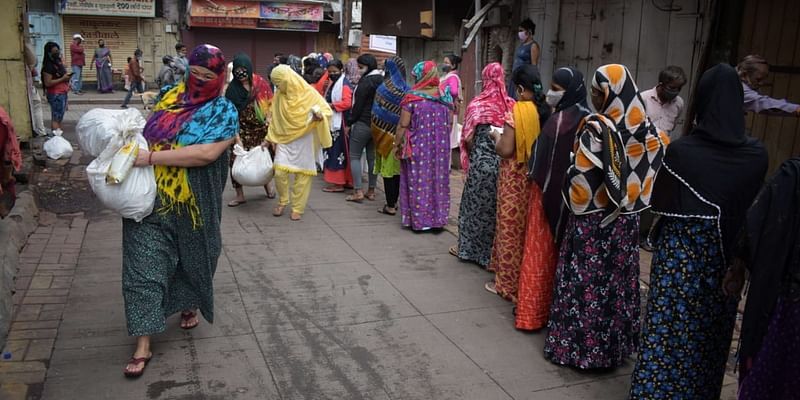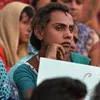Why India’s sex worker communities need support to survive the COVID-19 pandemic
On International Day of Sex Workers, SocialStory highlights the plight of the sex worker communities who have been rendered jobless during the lockdown and need support to survive the pandemic.
Born into a family of farmers in Pune, Maharashtra, Kiran Deshmukh had to listen to things like “don’t stay out after 7 pm”, “play only with dolls”, “cricket is not for girls”, “be graceful”, “never pick fights with boys” – only because she was a girl.
“But I would always make sure to stand up for myself in any way possible. But once I reached home, my elder brother would often beat and scold me. He would force me to ‘behave like a girl’ and not pick fights with boys,” Kiran tells SocialStory.
Unable to withstand the family pressure, she ran away from home at 18 years of age and boarded a train to Sangli, Maharashtra. However, she had no means to earn money, and resorted to sex work to sustain herself. She joined a brothel and has since been a member of the sex worker community for over 22 years.
“The lady who was running the brothel at the time made me understand what sex work was. She even asked me if I wanted to get married, but I didn’t want that. I just wanted to have my own freedom,” she says.

Kiran and the VAMP collective distributing ration kits to the sex workers in the community
Today, she is practising sex work, living with HIV, and is also the President of the National Network of Sex Workers (NNSW) as well as a board member of Veshya Anyay Mukti Parishad (VAMP), a collective for sex workers
In 2019, Kiran and other members of Sangli city faced the brunt of the Maharashtra floods. The NGOs that work for the welfare of sex workers, including Sangama and SANGRAM, stepped up to help them with the essential ration kits. However, Kiran says that rather than depending on the support, they asked to help them get back to work.
Based on their requirement, the NGOs helped them out. However, while they were still reeling from this disaster, the COVID-19 pandemic struck in 2020.
Social distancing – easier said than done
When they heard of the virus, many of the sex worker communities were taught how to practice hygiene measures like the usage of masks, sanitisers and the importance of handwashing. But while they were getting the hang of it, the nationwide lockdown was declared which severely impacted their livelihoods.
According to the National AIDS Control Organisation (NACO), there are about 800,000 sex workers in India, whose livelihoods were impacted due to the lockdown.
“A lot of the work has come to a halt, primarily because of the lockdown as most of the brothel areas are closed. Moreover, clients are not approaching the brothels because of the risks of the pandemic. So, since April 2020, with maybe a little work here and there, it has not been looking good for sex workers,” says Aarthi Pai, Executive Director of SANGRAM
Sampada Grameen Mahila Sanstha (SANGRAM), along with the collectives of sex workers – VAMP and Muskan, work with more than 6,000 female, male, and transgender sex workers in Western Maharashtra and North Karnataka.
Meena Sheshu, General Secretary of SANGRAM, shares that the plight of the workers has been extremely difficult in these trying times and the situation of the NGO workers has also not been any different.
“The work has been very difficult to find during the pandemic, and we, as well as the community members, feel very traumatised by COVID-19. But, NACO has given guidelines stating that the targeted interventions (TI) will continue,” says Meena.
She adds, “Regular mental health check-ups, half-yearly HIV testing and other similar activities will continue during the pandemic. I am grateful to the outreach workers and the TI workers who are holding up and working with the community on all these issues while battling the pandemic.”
SANGRAM also runs a hostel for children of sex workers in Karnataka, which had to be shut. After the lockdown was lifted, VAMP supplied the students with essentials like books, uniforms, stationery, etc.
“However, once the second wave struck, the children have also been brought back to their homes,” says Kiran.

SANGRAM's ration kit distribution in Maharashtra
The circumstances have not been too sunny for the sex worker community living along the southern coasts.
Gokila, a board member of NNSW and the President of the Vaadamalar Federation of Sex Workers in Madurai, Tamil Nadu says, “Once the lockdown was imposed, many of the community members found themselves unable to even afford milk for their children. While those with ration cards could access some items, those without it were completely helpless.”
She adds that many of them are unable to pay their house rent and are under pressure from landlords to vacate. Many who are HIV+ are unable to afford medical treatment like antiretroviral therapy (ART). The situation is not different for those living with other conditions like diabetes.
In Kerala, which had stricter lockdown rules to break the chain of spread, there was a severe impact on sex work. In addition, the sex workers were left in the lurch as they do not have a fixed community or delegated region where they can work. Most of the sex work in Kerala is street-based and house-based.
“The ferocity of COVID-19 combined with the heavy rains have impacted the sex workers severely. They are neither able to come out on the streets nor have clients come to their homes,” says Lalitha Satheesan, an outreach worker of Sanghamitra Suraksha for the last 20 years, coordinator of Kerala Network of Sex Workers (KNSW) and a board member of NNSW based in Thrissur.
Alternate livelihoods may not be an option
“While finding an alternative job may sound good on paper, it takes away the power from these women who have been working independently for the longest time, knowing how to manage their own lives. Working for another person can be difficult, in addition to other social challenges they might have to face due to the stigma around sex work,” says Ayeesha Rai, a Co-ordinator of NNSW, who is based in Miraj, Maharashtra.
Moreover, it may be a while before sex workers get back to work due to the uncertainty around the pandemic. Lalitha points that upskilling them may also be redundant due to the fear of the spread of the virus impacting many areas of work.
She adds, “Sure, we can teach them skills like tailoring etc, but what is the assurance that they will be able to do those jobs in these times?”
Support for community members
Like most NGOs working in such difficult times, organisations like SANGRAM, Sangama and Saheli Sangh, along with unions and collectives, have been aiding members and non-members in their vicinity to help them cope with the pandemic.
SANGRAM has been proactively supporting its members by distributing rations and sanitary items in Sangli and the adjoining districts. Meanwhile, the leaders of VAMP and Muskan did surveys and charted a distribution plan, linking it to SANGRAM.
In addition, they also distributed oximeters, vitamin supplements, as well as ART medicines at their doorstep in Sangli and Satara districts.
“The vaccination for most of the staff has been done as they are frontline workers. We are also trying to procure vaccinations for all the sex workers, as well,” says Meena.
Another NGO, Sangama, headquartered in Bengaluru, is also working to empower sex workers.
Nisha Gulur is a self-identified transwoman, the Vice President of NNSW and a supporting member of the Karnataka Sex Workers Union (KSWU). She is also a member of Sangama and has been supporting sex workers, the LGBTQIA+ community, and HIV patients for the last eight to nine years.

Distribution of ration kits by Saheli Sangh
“With crowdfunding and the support of some other donors, we have been providing dry ration kits since last year to our community members,” Nisha says.
Saheli Sangh, Pune, was also involved in the distribution of ration and safety kits. But while they did so, they ensured that social distancing was being practised, says Tejaswi Sevekari, Director of Saheli Sangh.
“Before distributing the rations, we also gave the sex workers tokens so that they could collect their kits on those specific days. This helped us reduce the crowding,” says Tejaswi.
Some women leaders like Gokila and Lalitha also tried getting some sponsorships and funding. They even put in money from their own pockets to extend their support to more community members.
“I even took a loan of Rs 15,000, not for personal reasons but for my children (referring to the other members of the community) so that they could feed their little ones,” says Gokila.

Distribution of rations in Kerala
Other initiatives
From October to December 2020, the Maharashtra government provided Rs 5,000 every month for three months (a total of Rs 15,000). This could be availed by most communities that have identity cards issued by the National AIDS Control Organisation.
Those women with school-going children received an additional Rs 2,500. The funds were disbursed through the Chief Minister’s Relief Fund and covered all 32 districts in the state.
Last month, the Ministry of Social Justice and Empowerment decided to provide a subsistence allowance of Rs 1,500 to each transgender person to make ends meet.
An NGO called Snehalaya, founded by Girish Kulkarni, has been empowering sex workers, educating their children, as well as creating awareness around STDs and unprotected sex. It has been distributing ration kits and creating awareness about the pandemic among the communities of Ahmednagar, Mumbai since 2020.

Snehalaya's ration distribution (Image: Snehalaya)
“We requested some of the women to put the sex work on hold. Since that stopped them from earning a livelihood, we distributed regular meals, grocery kits and other hygiene essentials to the women to support them,” says Girish.
The NGO also tried to provide other employment like ironing, washing clothes and selling vegetables to some women. Some were also given the job of caring for the children of sex workers in Snehalaya’s care homes.
“For those living with HIV, we provided them with medicines and ART treatment without fail, as much as we could,” he says.
Preparing for a better future
“We learnt in the lockdown that there is a need for regular fundraising to aid the sex workers. But what we need to focus on is crisis and disaster management to prevent this kind of situation,” says Tejaswi.
She also says that they are working to include sex workers in more government schemes and policies that can help them benefit in these trying times through initiatives like Sahayak Setu help desks. These desks assist sex workers to access social entitlements, welfare schemes, and health and legal services. With the support of NNSW, this is also being implemented in other cities.
“The community has also been coming together and developing a sisterhood, especially during the lockdown. They are doing activities together like cooking for the group, which helps them save money,” Tejaswi adds.
Kiran says that the pandemic reminds her of the HIV epidemic of 1990s. Though the teams created awareness, but in the end, they overcame the situation with a simple mantra – stay safe and keep others safe.
“During this time as well, we will brave the challenges and ensure that our members stay safe so that they can keep others safe,” she says.
Edited by Kanishk Singh











